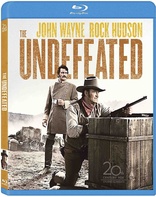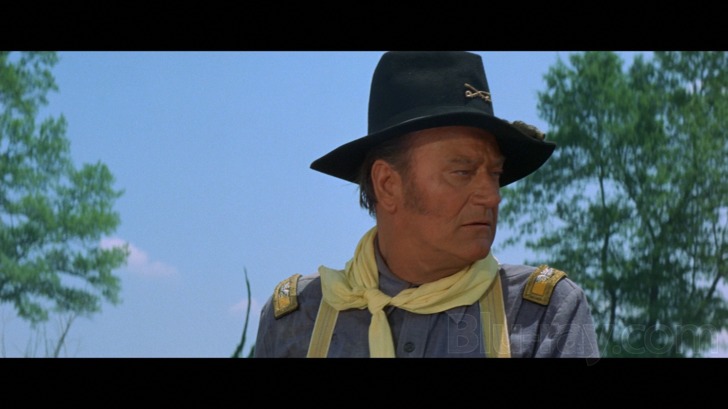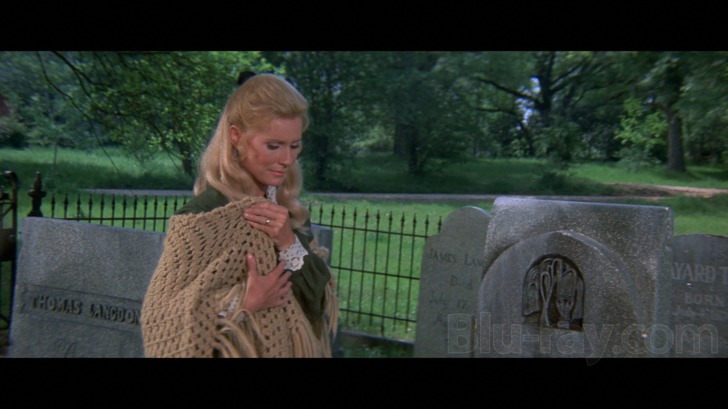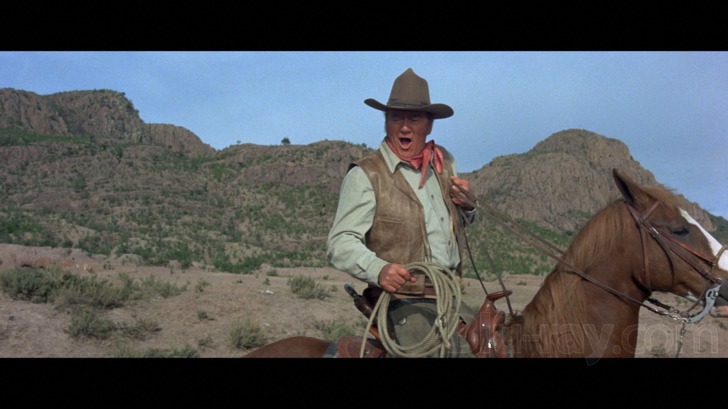The Undefeated Blu-ray Movie
HomeThe Undefeated Blu-ray Movie 
Fox Studio Classics20th Century Fox | 1969 | 119 min | Rated G | Dec 03, 2013

Movie rating
6.8 | / 10 |
Blu-ray rating
| Users | 0.0 | |
| Reviewer | 3.0 | |
| Overall | 3.0 |
Overview
The Undefeated (1969)
After the Civil War, ex-Union Colonel and ex-Confederate Colonel are leading two disparate groups of people through strife-torn Mexico.
Starring: John Wayne, Rock Hudson, Antonio Aguilar (I), Román Gabriel, Marian McCargoDirector: Andrew V. McLaglen
| Western | 100% |
Specifications
Video
Video codec: MPEG-4 AVC
Video resolution: 1080p
Aspect ratio: 2.37:1
Original aspect ratio: 2.35:1
Audio
English: DTS-HD Master Audio 5.1 (48kHz, 24-bit)
English: DTS-HD Master Audio Mono (48kHz, 24-bit)
Spanish: Dolby Digital Mono
French: DTS 5.1
Spanish: DTS-HD Master Audio Mono
German: DTS 5.1
Italian: DTS-HD Master Audio Mono
Subtitles
English SDH, French, German, Italian, Japanese, Spanish, Dutch
Discs
50GB Blu-ray Disc
Single disc (1 BD)
Playback
Region free
Review
Rating summary
| Movie | 2.5 | |
| Video | 4.5 | |
| Audio | 4.0 | |
| Extras | 0.5 | |
| Overall | 3.0 |
The Undefeated Blu-ray Movie Review
Well, the music's good, anyway. . .
Reviewed by Jeffrey Kauffman December 6, 2013It’s perhaps ironic that two of the 20th century’s topflight and most popular arrangers, guys who also at least dabbled
in writing film music, will probably be forever associated with film music that they did not write. Percy Faith had a
long and successful career, mostly at Columbia Records, where he was Artists and Repertoire Manager, shepherding the
careers of all sorts of major singers, including Tony Bennett, Doris Day, Rosemary Clooney and Johnny Mathis. But Faith
also had his own incredibly successful recording career, one which is remembered to this day for not one but two film
themes which he helped to immortalize. His complete restructuring of Georges Auric’s pretty but (in its original version)
somewhat formless main theme from the 1952 film Moulin Rouge became one of the biggest hits of 1953 in both
an instrumental and a vocal version that bore Faith’s imprimatur. Seven years later, Faith had the
biggest hit of the year (and still the largest selling instrumental record of the rock era) with his iconic rendition of Max
Steiner’s Theme from A Summer Place (ironically, Faith had been offered this film to score himself as part of a lure
the then new Warner Brothers Records dangled in front of him, which Faith refused). Faith had a sporadic career as a
film composer, though he actually
received an Oscar nomination for his song score adaptation for the memorable Love Me or Leave Me starring his
Columbia protégé Doris Day. He went on to write a few more scores, all of them beautifully orchestrated and featuring
typically lush Faith melodies (if you’ve never heard his score for the 1966 stinker The Oscar, you really should—
especially if you love gorgeous film music), but he simply seemed to be constitutionally impatient with the often political
side of the film business (more about that in a moment). Faith’s counterpart at RCA, Hugo Montenegro, never really had
the chart success that Faith enjoyed for some thirty years, but he is still remembered to this day for his bestselling
version of Ennio Morricone’s fantastic theme for The Good, The Bad and The Ugly. Like Faith, Montenegro
occasionally dabbled in film scores, adding memorable music to sometimes less than stellar films for a relatively short
period from 1967-1970 (with a brief resurgence in 1977).
It’s perhaps instructive to recount a rather funny anecdote which the fantastic lyricist Gene Lees recounted in an article
shortly after Faith’s death in 1976 which may help to illuminate why these men never pushed for more film work. Faith’s
son Peter was a well respected music agent and evidently handled Dave Grusin for a time. Grusin was hired by a
temperamental producer after the producer had already fired the first composer for a film. The producer evidently
hovered over Grusin’s shoulder literally while Grusin was attempting to notate the score, and he repeatedly made Grusin
pound out themes on a piano for the producer’s approval. When the recording session finally arrived, Grusin called the
producer up to the conductor’s podium, had the orchestra play four bars, stopped them and then turned to the producer
and asked, “Okay so far?” The producer, shocked, stammered an “okay”. Grusin then proceeded through the opening
cue, four bars at a time, pausing after each quartet of bars to ask the producer if everything was okay so far, until the
producer stormed out of the session. (The producer evidently later fired Grusin from the project as well.) This may be
one reason why Faith and Montenegro, who after all had successful recording careers of their own and didn’t
really need to bother with such annoying interference, chose not to score that many films. The
Undefeated features a nicely burnished score from Montenegro, one which traffics in the ever popular Copland
Americana vocabulary that came to associated with western films (with perhaps a tip o' the Stetson to Richard
Markowitz's theme for The Wild, Wild West). In fact, Montenegro’s contributions are one of The
Undefeated best elements, for the film never quite gels dramatically, despite its attempts to inject some late-sixties
relevance with an awkward subplot featuring a love affair between a Native American boy and a white girl. This 1969
western certainly doesn’t hold a candle to star John Wayne’s other film from that year, his Oscar winning True Grit, nor can it really compete with
two 1969 westerns which were in fact able to be relevant for their era, Butch Cassidy and the Sundance Kid and The Wild Bunch.

1969 was a transitional time for the Western film, and that is the crux of what ails The Undefeated. While The Duke took a rip snortin’ old fashioned romp through True Grit, and had one of his biggest late career hits, The Undefeated, while ostensibly even more old fashioned, tried instead to be “hip and happening”, kind of like the singers on The Lawrence Welk Show singing (in Welk’s own hilarious words) the “modern spiritual” One Toke Over the Line (it’s equally hilarious that accordion player Myron Floren appears to have inhaled a bit too much himself in his attempted introduction of the song). The Undefeated wants to approach all sorts of serious issues, like the aforementioned miscegenation element as well as the unexpected allying of Union and Confederate soldiers shortly after the end of the Civil War, but what it instead ends up being is a rote and more often than not pretty tired mishmash that plays more like a movie of a week than a big feature film offering the only on screen pairing of John Wayne and Rock Hudson.
Duke portrays Union Colonel John Henry Thomas, who has corralled a herd of wild horses that he wants to sell to the United States Cavalry. When he doesn’t get an offer he can’t refuse, he instead decides to transport the herd to Mexico, to offer them to Emperor Maximilian, who is involved in a bloody civil war. Meanwhile, Confederate Colonel James Langdon (Rock Hudson) has already decided to head south to Mexico to aid Maximilian, with hopes of reviving the Confederacy down there (in a plot point that may remind some of a similar device in Rio Conchos). Unsurprisingly, the former foes meet and soon band together in an example of “the enemy of my enemy is my friend”, when they’re both threatened by a nefarious Mexican General named Rojas (Antonio Aguilar).
A number of subplots—perhaps too many—enter the fray, including the love angle between Native American Blue Boy (Roman Gabriel), Thomas’ adopted son, and Charlotte (Melissa Newman), Langdon’s daughter, though a young buck named Bubba (Jan-Michael Vincent, billed as Michael Vincent) also has his eyes on Charlotte. A number of skirmishes between both Langdon and Thomas’ forces as well as their combined camps against the Mexicans ensues, while a number of supporting players, including Lee Meriwether, Ben Johnson, Paul Fix, and Merlin Olsen, have frankly minimal moments to strut their stuff.
Andrew V. McLaglen, who did good journeyman work helming a number of latter day Duke efforts, apes his father Victor’s famous director John Ford throughout The Undefeated, giving the viewer some gorgeous shots of various locales (the film was reportedly shot in Mexico and Louisiana). Huge vistas make the scenic side of The Undefeated rather remarkable, but the rest of this effort—aside from Montenegro’s invigorating score—is about as pedestrian as they come.
The Undefeated Blu-ray Movie, Video Quality 

The Undefeated is presented on Blu-ray courtesy of 20th Century Fox Home Entertainment with an AVC encoded 1080p transfer in 2.37:1. This is an incredibly gorgeous looking transfer which offers lushly saturated colors and a firm, precise and stable image. McLaglen's awesome panoramas offer spectacular depth of field, and even problematic issues like dust, gunsmoke, and, in one scene, mist, resolve very well without any issues. There are one or two moments of very minor crush—watch, for example, during the nighttime campfire scene where Rock and Duke share a little swig, and Rock's jet black hair more or less disappears into the night sky. Overall, though, this is a fantastic looking release which should easily please the film's fans.
The Undefeated Blu-ray Movie, Audio Quality 

The Undefeated's repurposed lossless DTS-HD Master Audio 5.1 track is relatively restrained, which is a good thing, though it occasionally suffers from a slightly phased quality to some of the foley effects (you'll hear it quite clearly in some of the gunfire, including the opening battle). Luckily, the music spills through the surrounds without any problems whatsoever, and the 5.1 mix definitely provides more mid- and low range for Montenegro's score than the also included DTS-HD Master Audio Mono track, which reproduces the film's original mix perfectly well. Dialogue is always cleanly presented, and neither track has any damage to report.
The Undefeated Blu-ray Movie, Special Features and Extras 

- Trailers (480i; 9:04) includes some foreign language trailers.
The Undefeated Blu-ray Movie, Overall Score and Recommendation 

The Undefeated is frequently incredibly scenic, but its story is trite and hackneyed. Montenegro's music gives the film what little impetus it manages to attain, and for those interested, I highly recommend the Film Score Monthly CD release of the score, which is paired with David Rose's score for Hombre (it's pricey as it's out of print, but it's worth it). Montenegro and Faith were both lumped into that often derided rubric "easy listening music" far too often (and for anyone further interested, I point you to Percy's fantastic album Black Magic Woman and/or Hugo's perfectly titled album Mr. Groovy for evidence of how brilliantly these guys could work within a rock-pop format), but their film music is far too often not only underappreciated, but not even recognized. (Montenegro made quite a mark in sixties television with The Man From U.N.C.L.E., and ironically Faith composed one of the best remembered television western themes of that era, The Virginian.) This Blu-ray offers great looking video and sounding audio, but the film itself is simply too tired to merit much consideration.
Similar titles
Similar titles you might also like

The Comancheros
1961

North to Alaska
Fox Studio Classics
1960

The Train Robbers
1973

The Horse Soldiers
1959

The Big Trail
1930

Rio Grande
1950

Rio Conchos
1964

In a Valley of Violence
2016

The Appaloosa
1966

The Last Sunset
El Perdido
1961

Vera Cruz
1954

Big Jake
1971

The Scalphunters
1968

The War Wagon
1967

The Cowboys
1972

Villa Rides
1968

The Professionals
1966

Chisum
1970

Cahill U.S. Marshal
1973

Joe Kidd
1972